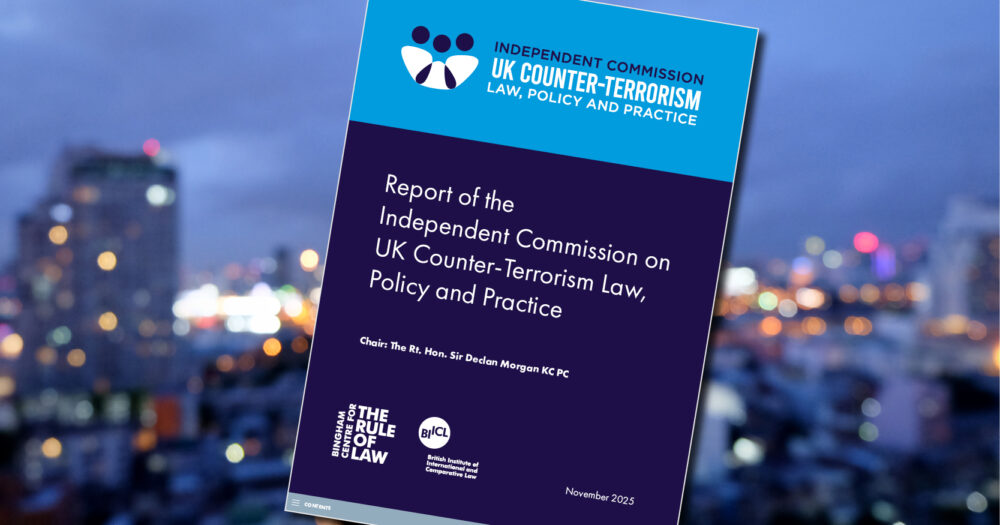“Inconsistent” training of Prevent practitioners who refer students “when in doubt” has encouraged over-reporting to the government’s counter-terrorism programme, sparking calls for a rethink from an independent review.
The Independent Commission on UK Counter-Terrorism Law, Policy and Practice, published yesterday, identified “problematic” issues with the “high rate of unnecessary” Prevent referrals that pick up young people with issues that are not terrorism-related.
It warned that young people with complex needs were being referred to Prevent because there is “no other system in place to help”.
The three-year-long review into the UK’s counterterrorism strategy, by the Bingham Centre for the Rule of Law and chaired by Sir Declan Morgan KC, called for the statutory duty of Prevent in public sector organisations to be reconsidered, as well as better training for educational staff.
The Prevent duty was first placed on schools and FE providers in 2015, and orders designated safeguarding leads (DSL) to report concerns of radicalisation to the police-led programme.
Previous FE Week analysis of Home Office statistical data on Prevent referrals in FE found sharp climbs in the number of young people being referred to the programme but few being taken to a further stage that offers personalised deradicalisation support.
Yesterday’s commission report collected evidence from 2022 over the following three years from over 200 experts to assess the efficacy of the UK’s counter-terrorism framework.
It found “acute” concerns that there was a risk that counter-terrorism powers are being applied too broadly i.e. capturing behaviour that is “harmful but not terrorist”.
The report added that fewer than 10 per cent of all referrals result in adoption as Channel cases.
“Even among these, some are not considered a real risk of radicalisation,” it said.
Most radicalisation concerns are categorised by the police as “conflicted” or “no ideology”.
The report found the lack of funding for community safeguarding and mental health services is causing Prevent referrals to be made as there is “no other system in place” to help young people with complex needs.
But the commission said there was an increased risk that channel panels, which discuss referral cases, could be overwhelmed by cases where there are significant risks of violence and miss instances of individuals being drawn to extremist violence.
It also warned against the Home Office’s recent internal review after the 2024 Southport attack, where attacker Axel Rudakubana was referred to Prevent three times but not considered a risk, that recommended referrals to be “routinely” escalated.
“The Prevent referral process is picking up many people who may be a risk to themselves or others and need support, but few are terrorism-related; providing support through a counter-terrorism programme is problematic given the serious concerns about Prevent, its effectiveness and its impact on those targeted,” the report said.
Gut instinct of practitioners could ‘reinforce stereotypes’
The commission also heard the 2015 implementation of the Prevent duty in colleges led to a “significant step change” in training and has become embedded into processes and practices for safeguarding.
But while training of practitioners has improved confidence in reporting, the report said it has led to an “increase in the over-reporting of less concerning cases”.
“The benefits of a statutory duty must be carefully balanced against the negative impacts of inappropriate or misplaced referrals,” the report added.
The commission also heard evidence that demonstrated inconsistencies in training and resources, leaving staff to rely on their ‘gut instinct’, which it warned could “reinforce stereotypes and discrimination”.
“The resultant reliance on ‘gut instinct’ combined with ’refer-when-in-doubt’ advice encourages overreporting and risks escalating manageable issues unnecessarily,” the commission warned.
Polly Harrow, assistant principal at Kirklees College and DfE’s further education student support champion, said the findings were “seriously worrying” and suggested a more robust strategic approach is “urgently required” to staff training.
“Whilst it is not my personal experience that cases have been ‘over-reported’, I can see how this could easily be the case, given the serious concerns educators have about ‘getting it wrong’ and the potential consequences of that,” she added.
Harrow said that safeguarding practitioners “typically” think it better to over-report than under-report.
“I take the point in the review that some referrals to Channel are deemed to be manageable at source. I don’t doubt that this is the case, however it does suggest that further clarity is needed not only in terms of definitions and terminology, but that the overall scope of the duty needs to be further refined to ensure maximum effectiveness.”
The report also decried the ‘Educate Against Hate’ website resources, revealing there was an “absence of a human rights-based approach”.
“Many resources neglected young people’s developing opinions and agency, frequently adopting a patronising tone,” it said.
In other cases, the commission found that some education institutions avoided discussing difficult issues from poor resources or rely on third parties to facilitate discussions.
Its research also revealed that students are reluctant to debate difficult views, which could suppress legitimate discussion and is a key aim of counterterrorism work.
Last year, fears emerged that learners were self-censoring themselves to avoid being flagged as Home Office data showed a drop in college referrals.
The review therefore recommended the Department for Education explore how to improve training for school and college staff to create “safe spaces” for discussion.
Other recommendations included a focus on people who pose significant risk to public safety rather that those with extremist ideas, more research into terrorism and extremism definitions before expanding Prevent categories, and a reconsideration of the need for a specific Prevent duty.
The Department for Education was contacted for comment.
















Your thoughts